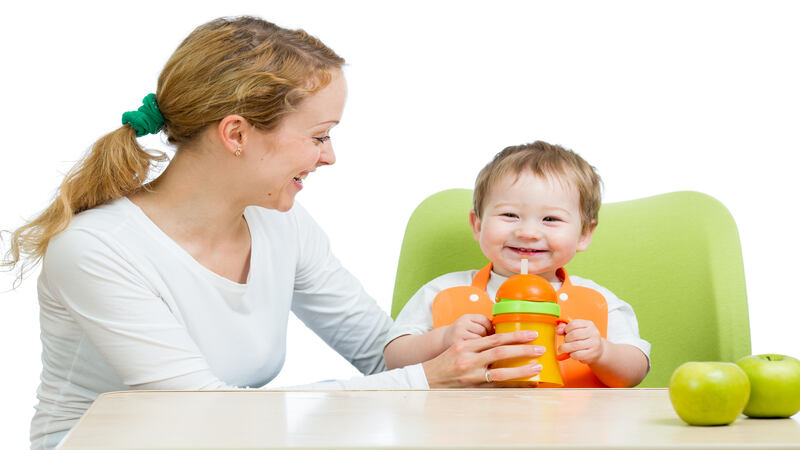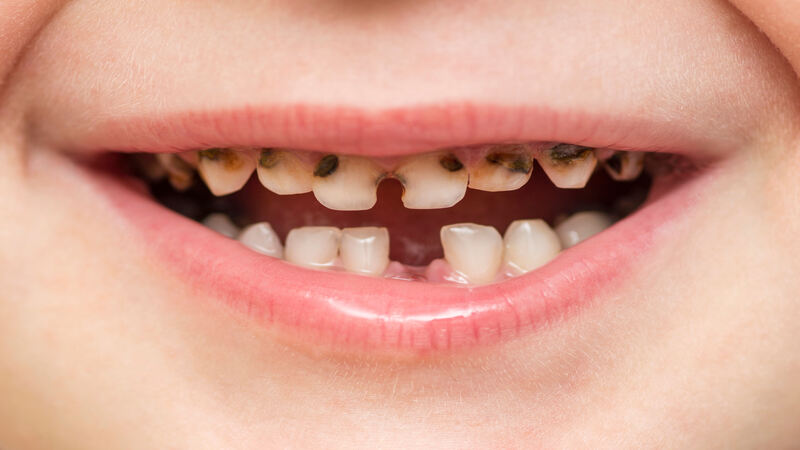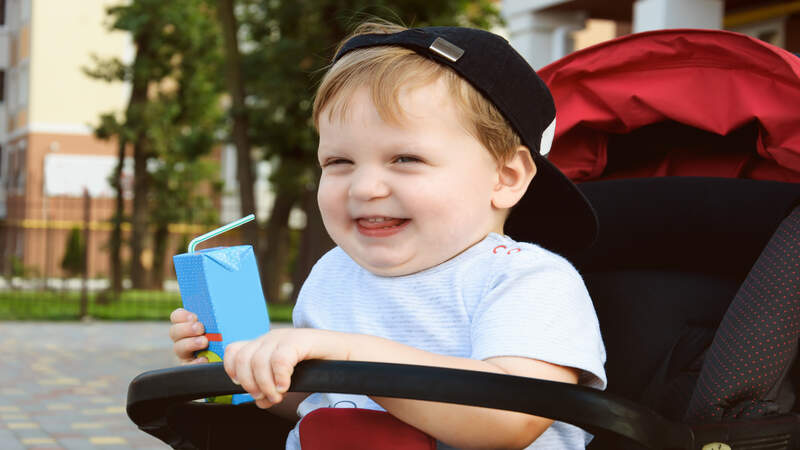
Breast and formula milk will nourish your baby till the first six months of her life, and meet all their nutrition needs. After six months, when your baby starts solids, you can introduce her to pureed fruits and vegetables. Some parents introduce fruit juice to babies around this time. But is fruit juice safe for babies?
Fruits are excellent sources of nutrition for babies and form a rich source of vitamins and antioxidants and also act as one of the important sources of hydration. However, how you introduce this fruit will dictate the nutrients your baby will receive.
Is Fruit Juice Good For Babies?
Fruits are a good source of vitamins and nutrients a growing baby needs. It is good to add a variety of fruits to a baby’s diet. However, babies less than six months old do not need anything other than breast milk or formula.
Older babies can be given fruits and vegetables in pureed form and as juices (1). Offer your baby a variety of textures and flavours, to help start them off on a journey of taste.
If you prefer, fruit and vegetable juices can also be included in your baby’s diet. However, fruit juice should be offered to a baby prudently, as it can affect the milk intake, a vital need of your baby (2).
Fruit juice has caught everyone’s attention as a bad influencer of pediatric obesity. In the context of a healthy dietary pattern for babies, regular use of fruit juices leads to a lack of necessary growth nutrients (3).
When Can I Start Giving Fruit Juice to my Baby?

After your baby turns one, you can give them 100% fruit juice, a naturally nutrient-dense beverage, on occasion. But do remember that the sugar content in natural fruit juices could be similar to sweetened beverages (4).
Infants under 12 months should not drink juice at all (5). However, breast milk, formula milk, low-fat milk, semi-solid foods, and fruit puree should be the primary options for babies (6).
Are There Any Benefits of Giving Fruit Juice For Babies?
A high-quality 100% fruit juice is a source of free sugars; it also contains bioavailable micronutrients and plant bioactive compounds in amounts close to whole fruits.
Fruit juice (up to 50 mL per day) may contribute to increased vitamin C, potassium, magnesium, folate, and fiber intakes, as well as energy and total sugars in babies. (7). An intact fresh fruit is more nutrient-dense compared to fruit juices (8).
Risks of Giving Fruit Juices to Babies

Most fruit juices do not provide nutritional benefits to infants during this developmental stage. Here are a few points to consider when introducing fruit juices to your baby.
1. Weight issues
Several studies have found that frequent replacement of artificial fruit juices with water or milk can promote unhealthy weight gain (body fatness development) in babies (9).
Babies who consume excessive amounts of sugary drinks are more likely to develop obesity, type 2 diabetes, cardiovascular disease, and dental cavities later in life (10) (11).
2. Early Sweet Tooth
Although healthy, introducing fruit juice as early as post-6 months may raise babies’ chance of consuming more sugary beverages as they grow older (12).
The timing of fruit juice introduction in infancy, as well as later intake of sweet-tasting foods and beverages, may hurt their anthropometric outcomes (13).
3. Poor Nutrient Supply
As babies consume more fruit juice, their intake of milk, milk products, milk cereal drinks, legumes, vegetables, and whole fruit declines.
Their fondness for sweet-tasting meals and beverages intensifies throughout infancy. This is concerning because milk is the main source of calcium, vitamin D, and protein in their diet.
4. Nursing Bottle Caries
Changes in beverage patterns of growing babies mostly decreased milk intakes and increasing juice and other sugary beverages in bottles, lead to dental caries in babies (14).
Proper oral hygiene practices are crucial, but preventing nursing bottle caries requires eliminating sugary drinks in bottles, avoiding pacifier use with bottles, and limiting bottle feeding duration.
5. Non-specific Chronic Diarrhea
This has been linked to excessive juice consumption by babies, particularly artificial juices high in sorbitol (an artificial sweetener) and with a high fructose-to-glucose ratio. This refers to carbohydrate malabsorption (14A).
Different types and amounts of sugars in fruit juices can impair a baby’s capacity to digest them effectively, resulting in diarrhea.
[Read : How To Care For Baby’s Teeth]
How Much Juice Can Babies Have?

The Nutrition Chapter of the Indian Academy of Pediatrics (IAP) advices infants and young children (age <2 years) should not consume fruit juices or drinks (15).
However, pureed regional and seasonal fruits might be considered. The intake of 100% fruit juices should be limited to 25-50 mL per day.
Can I Give Fruit Juice To My Infant For Constipation?
Babies routinely suffer from constipation. For babies over the age of 6 months, you can offer your baby a beaker or a cup of fruit juice such as apple juice, pear juice or orange juice with a little pulp for constipation relief. Some parents also prefer prune juice for constipation in babies.
Babies younger than 6 months should be given only mother’s milk and formula. If your baby is experiencing constipation, talk to your doctor for medications or remedies to relieve the condition.
[Read : 10 Foods that Cause & Help Relieve Constipation in Babies]
Precautions to Take When Giving Fruit Juices to Babies

Remember to always limit the consumption of juice to your baby. If you want to give juices to your baby, follow the given safety measures:
- Before giving your baby fruit juice, make sure he or she can sit up and sip from a cup.
- Your little one should not be made to drink juice all day. 3-4 ounces of juice once in a way is sufficient for your baby. Giving more juice may reduce their appetite for other foods.
- If offering packaged fruit juice Give 100% pasteurized juice to your baby. Avoid giving artificial fruit drinks, squashes, and other such liquids.
- Opt for seasonal fruits or vegetables rather than choosing packaged cold stored ones.
- Do not give juices in a bottle at bedtime, offer it in a cup to your baby during meal times. Drinking juice before bedtime or in a bottle increases the risk of tooth decay.
- Offer one fruit juice at a given time, and mix the flavors gradually.
- Opt for fruit and vegetable juice combos like carrot-apple, and tomato-carrot so that your baby gets all necessary nutrients. If you offer them fruit juice first, they might detest the vegetable juice owing to the sweet taste of the fruit juice.
- Never offer chilled or cold juices, serve juice to your baby at room temperature.
- Never keep prepared juice for more than 10-15 minutes as it may develop contamination and lose nutritional value.
- Do not force your baby on any particular juice if they do not like it at all.
Homemade Juices vs Packaged Juices For Babies

Homemade juices are always better over packaged juices which are generally loaded with sugars and preservatives.
Though homemade juice cannot be 100% pasteurized, and the likelihood of pathogens is there, make sure you follow optimum hygiene routines if you are making fruit juice for your little one.
Ensure that the fruit is fresh, cleaned, washed, and not overripe.
The processor or blender used should also be clean, preferably the blades are boiled. If the fruit has seeds (like melon) de-seed the fruit first before making the juice. Adding salt, sugar, or chat masala may not be good for the baby’s digestive system so let her enjoy the natural taste of fruit juice.
Fruit squashes should not be offered to babies due to their sweetener content. Always taste the food (juice, fruit, or anything) before you give it to the baby.
If offering packaged fruit juice Give 100% pasteurized juice to your baby. Avoid giving fruit drinks, squashes, and other such liquids.
Always remember, fruit juices and any sweetened beverages should be given in moderation and rarely. This should not be made a daily or weekly practice due to the long-term health implications for babies (16).
Can Fruit Juices Cause Dental Problems In Babies?

Fruit juices do contain sugar, which needs to be controlled as exposure to sugar can cause dental problems in your baby. Undernourishment can also happen as babies tend to like the sweet taste of juice and refuse to have other foods.
Sugars in fruit juice can predispose to inappropriate weight gain (too much or too little), particularly at a young age.
Since fruits are generally considered healthy, parents tend to ignore the harmful effects of fruit juice sugars. Fruit juice should never be given to a baby in a bottle at nap times as this can result in dental decay. Always wipe your baby’s gums, and teeth with a soft washcloth after giving them fruit juice.
Can Fruit Juice Be Harmful To My Infant?
Anything in excess can be harmful for babies. Giving too much fruit juice to babies may harm them in the following ways:
- If a baby drinks juices excessively, they do miss out on many essential vitamins, minerals, or nutrients present in other foods. This may lead to anemia or malnutrition.
- Too much apple juice may lead to loss of bowel movements or diarrhea.
- Fruit juices that contain a high level of fructose may result in gas, stomach problems, and restlessness in babies.
- Sugar in fruit juice can result in dental caries.
- High sugar content inn fruit juices may lead to obestiy and poor dietary choices and acceptance in the long run.
At first, you can try feeding your baby by steaming the fruits so as to get rid of pesticides and ensure easy digestibility. Once your baby is used to the taste and does not show any reaction or allergies, you can go for raw fruit juices straight from the blender.
Fruit juice for babies may not be ideal in terms of nutrition but can be given as once-in-a-way treat. Fruit pulps and mashes are always better compared to fruit juices. With some precautions and care, fruit juices can be occasionally given to babies.
FAQ’s
1. Can a 6 Month Old Baby Drink Juice?
No, a 6-month-old baby cannot consume fruit juice. To get started, serve whole fruit steamed or pureed.
2. What Can I Give my 6 Month Old Baby to Drink
A 6-month-old baby can drink breast milk, simple water, milk-cereal drink, dal-rice water, or vegetable soups.
3. When to Avoid Fruit Juices For Babies?
If your baby has dehydration or diarrhoea, avoid giving him fruit juice. The high sugar content may worsen digestion and bowel movements resulting in increased diarrhea leading to further health complications.
References
- Ruxton CHS, Myers M. Fruit Juices: Are They Helpful or Harmful? An Evidence Review. Nutrients. 2021 May 27;13(6):1815. – https://pubmed.ncbi.nlm.nih.gov/34071760/
- Gupta P, Shah D, Kumar P, Bedi N, Mittal HG, Mishra K, Khalil S, Elizabeth KE, et.al, Pediatric And Adolescent Nutrition Society (Nutrition Chapter) Of Indian Academy Of Pediatrics. Indian Academy of Pediatrics Guidelines on the Fast and Junk Foods, Sugar Sweetened Beverages, Fruit Juices, and Energy Drinks. Indian Pediatr. 2019 Oct 15;56(10):849-863. – https://pubmed.ncbi.nlm.nih.gov/31441436/
- Melvin B. Heyman, Steven A. Abrams, Leo A. Heitlinger, Michael deCastro Cabana et.al, Fruit Juice in Infants, Children, and Adolescents: Current Recommendations, Pediatrics, AAP Publications, American Academy of Pediatrics – https://publications.aap.org/pediatrics/article/139/6/e20170967/38754/Fruit-Juice-in-Infants-Children-and-Adolescents
- Pepin A, Stanhope KL, Imbeault P. Are Fruit Juices Healthier Than Sugar-Sweetened Beverages? A Review. Nutrients. 2019 May 2;11(5):1006 – .https://pubmed.ncbi.nlm.nih.gov/31052523/
- Recommended Drinks for Children Age 5 & Younger, HealthyChildren.org – https://www.healthychildren.org/English/healthy-living/nutrition/Pages/recommended-drinks-for-young-children-ages-0-5.aspx
- Foods and Drinks to Encourage, Nutrition, CDC – https://www.cdc.gov/nutrition/infantandtoddlernutrition/foods-and-drinks/foods-and-drinks-to-encourage.html
- Dicklin MR, Barron R, Goltz S, Warren J, Boileau T, Pigat S, Maki KC. Fibre and micronutrient intakes among fruit juice consumers and non-consumers in the UK and France: Modelling the effects of consumption of an orange pomace juice product. J Hum Nutr Diet. 2022 Dec;35(6):1230-1244. – https://pubmed.ncbi.nlm.nih.gov/35174931/
- Rosell M, Nyström CD. Fruit juice – a scoping review for Nordic Nutrition Recommendations 2023. Food Nutr Res. 2024 Feb 6;68. – https://www.ncbi.nlm.nih.gov/pmc/articles/PMC10870970/
- Nguyen M, Jarvis SE, Chiavaroli L, Mejia SB, Zurbau A, Khan TA, Tobias DK, Willett WC, Hu FB, Hanley AJ, Birken CS, Sievenpiper JL, Malik VS. Consumption of 100% Fruit Juice and Body Weight in Children and Adults: A Systematic Review and Meta-Analysis. JAMA Pediatr. 2024 Mar 1;178(3):237-246 –https://pubmed.ncbi.nlm.nih.gov/38227336/
- Wu AJ, Aris IM, Rifas-Shiman SL, Oken E, Taveras EM, Hivert MF. Longitudinal associations of fruit juice intake in infancy with DXA-measured abdominal adiposity in mid-childhood and early adolescence. Am J Clin Nutr. 2021 Jul 1;114(1):117-123. – https://pubmed.ncbi.nlm.nih.gov/33829237/
- Von Philipsborn P, Stratil JM, Burns J, Busert LK, Pfadenhauer LM, Polus S, Holzapfel C, Hauner H, Rehfuess E. Environmental interventions to reduce the consumption of sugar-sweetened beverages and their effects on health. Cochrane Database Syst Rev. 2019 Jun 12;6(6):CD012292. – https://pubmed.ncbi.nlm.nih.gov/31194900/
- Fujiwara A, Okada E, Okada C, Matsumoto M, Takimoto H. Association between free sugar intake and nutrient dilution among Japanese children and adolescents: the 2016 National Health and Nutrition Survey, Japan. Br J Nutr. 2021 Jun 28;125(12):1394-1404.https://pubmed.ncbi.nlm.nih.gov/32943121/
- Benton D, Young HA. Early exposure to sugar sweetened beverages or fruit juice differentially influences adult adiposity. Eur J Clin Nutr. 2024 Jun;78(6):521-526. – https://pubmed.ncbi.nlm.nih.gov/38491133/
- Dennison BA. Fruit juice consumption by infants and children: a review. J Am Coll Nutr. 1996 Oct;15(5 Suppl):4S-11S. https://pubmed.ncbi.nlm.nih.gov/8892177/
- Gupta P, Shah D, Kumar P, Bedi N, Mittal HG, Mishra K, et.al; Pediatric And Adolescent Nutrition Society (Nutrition Chapter) Of Indian Academy Of Pediatrics. Indian Academy of Pediatrics Guidelines on the Fast and Junk Foods, Sugar Sweetened Beverages, Fruit Juices, and Energy Drinks. Indian Pediatr. 2019 Oct 15;56(10):849-863 – https://pubmed.ncbi.nlm.nih.gov/31441436/
- Piyush Gupta, Fruit Drinks – How Healthy And Safe, ResearchGate – https://www.researchgate.net/profile/Piyush-Gupta-39/publication/5484313_Fruit_drinks_How_healthy_and_safe/links/64795da079a7223765079af3/Fruit-drinks-How-healthy-and-safe.pdf?origin=scientific-contributions.
Read Also : Does Adding Sugar To Baby’s Food Help Digest Better?

